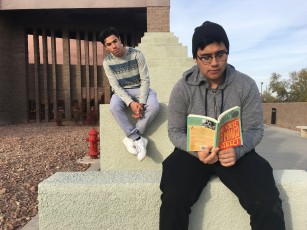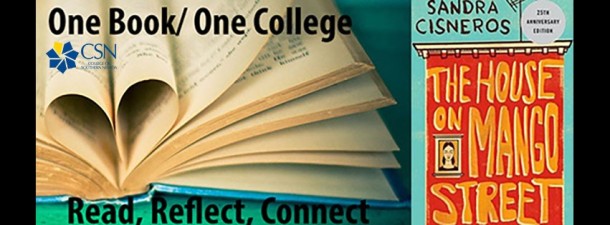 By Valeriya Bondarenko
By Valeriya Bondarenko
“The House on Mango Street” is stirring up important conversations and connections at College of Southern Nevada as students take part in One Book One College.
According to The Center for the Book’s website, One Book One College is a nationwide book club building a sense of community while promoting literacy. Starting in the late ‘90s One Book projects were initiated by the Washington Center for the Book supported by Library of Congress. Some of the popular books read in the past included: “To Kill a Mockingbird,” “A Lesson Before Dying” and “Fahrenheit 451.” The current selection is “The House on Mango Street.”
CSN started its book club last year. Month by month students are joining and faculty are leading the way. Some faculty are teaching “The House on Mango Street” as part of their course instructions, and students and staff are participating in discussions and events hosted to enhance the reading experience and promote community, according to CSN’s English department’s website.
According to the plot summary “The House on Mango Street” by Sandra Cisneros is about a little girl Esperanza who moves with her family to a house on Mango Street. It’s a small crumbling red house in a poor urban neighborhood. Esperanza is ashamed of her family’s poverty and describes several instances in which she lies or tries to hide the fact that she is poor by saying she lives in a different house. In a series of vignettes this book introduces a collection of characters and explores their cultural backgrounds—particularly Esperanza’s Mexican heritage—and how they are affected by poverty, exile and the restrictions of prescribed gender roles.
 Kody Lightfoot, English instructor at CSN, is very involved in this program. “Previous colleges where I taught used One Book programs and I really loved how they created a sense of community and collegial discussion. I noticed that the programs had a similar effect on the students, particularly at commuter schools. The students were able to see how they were a part of the larger community. These types of communal connections are incredibly beneficial to students in all disciplines and have been shown to improve student performance and to increase the odds of degree completion.”
Kody Lightfoot, English instructor at CSN, is very involved in this program. “Previous colleges where I taught used One Book programs and I really loved how they created a sense of community and collegial discussion. I noticed that the programs had a similar effect on the students, particularly at commuter schools. The students were able to see how they were a part of the larger community. These types of communal connections are incredibly beneficial to students in all disciplines and have been shown to improve student performance and to increase the odds of degree completion.”
Lightfoot uses “The House on Mango Street” as part of her instruction in ENG 100 Composition Enhances and ENG 223 Themes of Literature.
“I heard about One Book One College through my Professor Ms. Kody Lightfoot,” said Marissa Canales, CSN student. “I would definitely recommend joining this project to others.” She thinks it’s a great way for people to get involved and be introduced to a new book that has a bit of everything.
“I love the fact how other CSN campuses are reading the book at the same time,” said Kate Ramsay, CSN student who is reading the book. “The book came alive when reading it on the hike and we ate dried mangoes while hearing the professor read ‘The House on Mango Street’. It made my reading experience more interesting because the students and professors on the hike would share similar experiences they had correlating to the vignette we read.”
One Book One College creates a bond between students, teachers and books: making the reading experience much more. At CSN, in the past year, “The House on Mango Street” has become a topic to talk about and a way to share experiences with others.
One Book One College will meet April 5 at Charleston campus for a book celebration in front of the D Building from 2 to 4 p.m. Come join in the fun.




